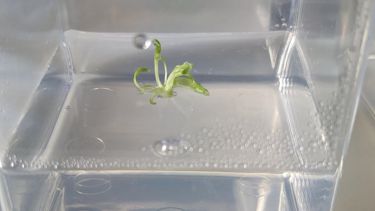Exploring and Exploiting Epigenetic Plant Immunity
The University of Sheffield and the plant breeding company Enza Zaden are working in partnership to exploit stress memory for the next generation of disease resistant plants.
The four year project is funded by a BBSRC Industrial Partnership Award from UKRI. The project’s main aim is to develop new tools and resources to explore and exploit this epigenetically controlled plant immunity.
Project Summary
Crop protection is vital for global food supply chains. Despite advancements in agricultural technology, plant diseases remain a threat to food security. Legislative restrictions on pesticide use highlight the urgent need for sustainable crop protection methods. Our research addresses this challenge.
Quantitative disease resistance offers broad-spectrum protection against taxonomically unrelated pathogens with different lifestyles. Unlike gene-for-gene resistance, this form of resistance is based on multiple genes and mechanisms, making it more resilient against pathogen coevolution. However, its effectiveness is limited, and in most cases merely slows down disease progression rather than preventing it.
To enhance quantitative resistance, we study induced resistance (IR), a long-lasting resistance response that is based on a form of immune memory and typically develops after plants recover from stress in their environment. Our previous work has shown that IR in Arabidopsis is epigenetically controlled, involving long-lasting biochemical modifications to DNA (methylation). When introduced artificially, these epigenetic modifications are stable for multiple generations and offer near-complete protection against downy mildew disease. However, translating this durable form of epigenetically controlled resistance from Arabidopsis to crops is a challenge due to the fact that crops have much larger genomes.
Our project aims to develop a more precise method for introducing epigenetic modifications in plants. This adjustable epi-mutagenesis offers a new tool to select for varieties with desirable epigenetic traits, including primed disease resistance. We will study how adjustable epigenetic changes at the level of DNA methylation prime plant immunity in Arabidopsis, and translate this knowledge to select for epigenetically altered lettuce lines expressing primed disease resistance.
The project is conducted in partnership with Enza Zaden, a major crop breeding company.
Join us in redefining crop protection and securing the future of sustainable food production. Together, we can safeguard global food supply chains.
Project History
Due to the urgent need to find better and more sustainable plant protection methods, Professor Jurriaan Ton, from the University of Sheffield’s Institute for Sustainable Food, and his team, investigated how plants are able to acquire long-lasting immunity against these stressors.
The findings, published in Nature Plants, explain a mechanism of how plants ‘remember’ the stress from a previous attack, and that this long-term memory is encoded in a family of 'junk DNA’ that can prime defence genes for several weeks against further attacks.







